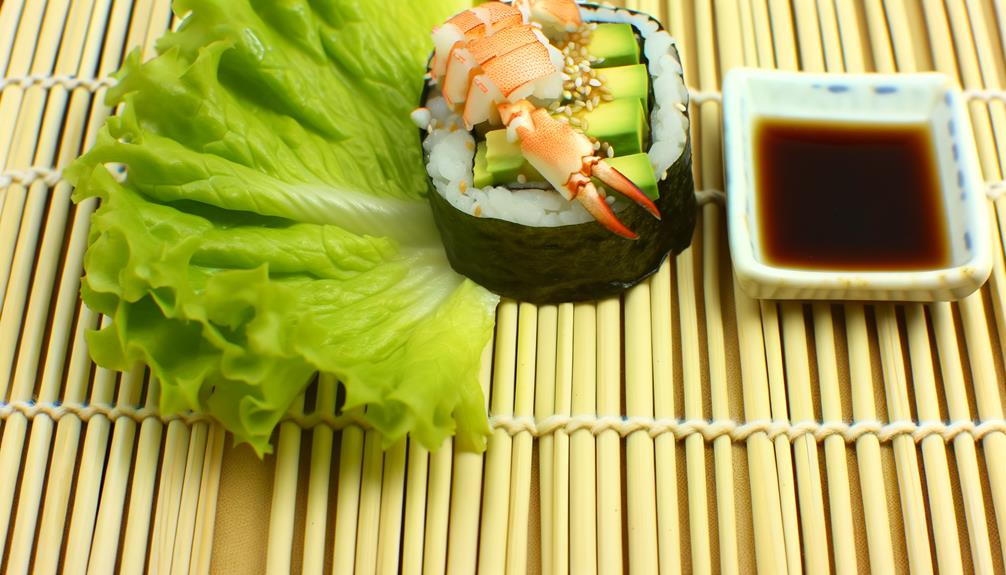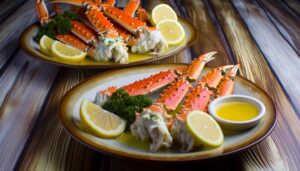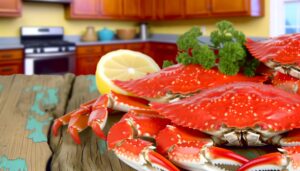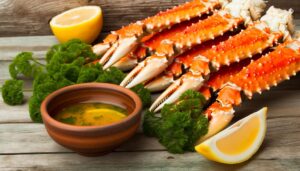How to Determine if Snow Crab Rolls Are Healthy
Snow crab rolls can be a healthy choice if you consume them consciously. They provide high-quality protein, omega-3 fatty acids, and essential vitamins like B12 and D.
The rolls contain avocado for healthy fats and nori seaweed for iodine and fiber. However, watch out for high-calorie mayonnaise, sodium-packed soy sauce, and rapid blood sugar spikes from white rice.
Choosing rolls made with real crab meat over imitation crab meat also guarantees more health benefits. Balancing their nutrient-rich profile with potential drawbacks is key, and there's more to explore about their benefits and considerations.

Key Takeaways
- Snow crab rolls offer high-quality protein, omega-3 fatty acids, and essential vitamins and minerals.
- They provide moderate calories (200-250 per roll), supporting balanced dietary choices.
- Rich in vitamins B12 and D, zinc, selenium, and magnesium, snow crab rolls enhance overall health.
- Potential drawbacks include high sodium content from soy sauce and rapid blood sugar spikes from white rice.
- Including fiber-rich vegetables or whole grains with snow crab rolls can improve their nutritional profile.
Ingredients of Snow Crab Rolls
Snow crab rolls typically consist of snow crab meat, mayonnaise, cucumber, avocado, and sushi rice wrapped in nori seaweed.
Snow crab meat is a rich source of protein and omega-3 fatty acids, essential for heart and brain health.
Mayonnaise adds creaminess but also introduces fats and calories, so moderation is key.
Cucumber provides hydration and vitamins like K and C, offering a crunchy, revitalizing element.
Avocado contributes healthy monounsaturated fats and fiber, promoting satiety and cardiovascular benefits.
Sushi rice, seasoned with vinegar, delivers carbohydrates for energy but can be high in sugar.
Finally, nori seaweed is packed with iodine and other trace minerals, supporting thyroid function.
Understanding these ingredients helps you make informed choices about your diet.
Nutritional Breakdown
When considering snow crab rolls, you'll find they typically offer a moderate caloric content. They provide essential nutrients like protein, omega-3 fatty acids, and vitamins, which contribute to overall health.
Understanding these nutritional aspects can help you make informed dietary choices.
Caloric Content Analysis
Understanding the caloric content of snow crab rolls is vital for evaluating their nutritional benefits. Typically, a single snow crab roll contains around 200-250 calories. This caloric value comes from the combination of crab meat, rice, seaweed, and any extra ingredients like avocado or mayonnaise.
Crab meat itself is relatively low in calories, contributing approximately 80-100 calories per roll. However, the rice portion can add another 100-150 calories, depending on the serving size. It's important to keep in mind these figures if you're monitoring your calorie intake.
The caloric density can vary based on the roll's preparation and additional components. Being mindful of these details helps you make informed dietary choices without compromising taste.
Essential Nutrients Overview
Beyond just calories, snow crab rolls offer a variety of important nutrients that contribute to a balanced diet. You'll find high-quality protein, which supports muscle maintenance and repair.
Snow crab is also rich in omega-3 fatty acids, beneficial for heart health. Additionally, these rolls provide essential vitamins like B12, necessary for nerve function, and minerals such as zinc and selenium, which boost your immune system.
The inclusion of nori (seaweed) in the roll adds iodine and additional fiber, further enhancing its nutritional profile. When combined with vegetables, snow crab rolls offer a well-rounded intake of vitamins, minerals, and antioxidants, making them not just a tasty but also a nutritionally valuable option.
Protein Content
You'll find that snow crab rolls are a high-protein option, making them an excellent choice for muscle maintenance and growth.
The protein quality of snow crab is notable, as it contains essential amino acids your body needs.
High Protein Source
Snow crab rolls offer a substantial protein content, making them an excellent option for those looking to boost their protein intake. Each roll typically contains between 10-15 grams of protein, depending on the serving size and additional ingredients. Protein is essential for muscle repair, immune function, and overall cellular health. By including snow crab rolls in your diet, you're not only enjoying a delicious meal but also supporting your body's nutritional needs.
Furthermore, protein helps in maintaining satiety, which can aid in weight management. For active individuals or those with higher protein requirements, snow crab rolls provide a convenient and tasty way to meet dietary goals. Their high protein content makes them a beneficial addition to a balanced, nutrient-rich diet.
Protein Quality Analysis
When examining the protein quality of snow crab rolls, it's essential to take into consideration both the amino acid profile and bioavailability.
Snow crab offers a complete protein, indicating it contains all necessary amino acids your body requires but can't generate on its own. Furthermore, the bioavailability of crab protein is high, which means your body can effectively absorb and utilize these amino acids. This makes snow crab an outstanding protein source compared to many other seafood options.
However, the overall healthiness of snow crab rolls also relies on other ingredients and preparation methods. It's important to take into account elements like added sugars, refined carbs, and unhealthy fats that may accompany the crab. Therefore, while the protein quality is commendable, balance is key.
Carb and Fiber Analysis
Analyzing the carbohydrate and fiber content of snow crab rolls reveals important insights into their potential impact on your diet. Typically, snow crab rolls contain moderate amounts of carbohydrates, mainly from the rice used in sushi rolls. This provides you with a quick source of energy.
However, the fiber content in these rolls is relatively low, as white rice lacks significant fiber. Low fiber intake can affect digestion and satiety. If you're aiming for a balanced diet, consider pairing snow crab rolls with fiber-rich vegetables or a whole grain alternative to boost fiber intake.
Understanding these components helps you make informed choices about incorporating snow crab rolls into a nutritious meal plan.
Vitamin and Mineral Profile
Evaluating the vitamin and mineral profile of snow crab rolls provides significant insights into their nutritional benefits. Snow crab is a rich source of vitamins such as B12 and B6, which are essential for nerve function and energy metabolism.
You'll also find significant minerals like zinc, selenium, and magnesium. Zinc supports immune function, while selenium acts as an antioxidant, protecting cells from damage. Magnesium plays a critical role in muscle and nerve function.
Additionally, snow crab contains phosphorus, which is crucial for bone health. By including snow crab rolls in your diet, you're not just enjoying a tasty meal but also benefiting from a variety of essential nutrients that support overall health and well-being.
Potential Health Benefits
Including snow crab rolls in your diet can offer several potential health benefits due to their rich nutrient profile. Snow crab is a good source of high-quality protein, which is essential for muscle repair and growth. Additionally, it provides omega-3 fatty acids, which can support heart health by reducing inflammation and potentially lowering blood pressure.
The presence of vitamins like B12 and D can boost your energy levels and aid in maintaining strong bones, respectively. Snow crab also contains important minerals such as zinc and selenium, which play roles in immune function and antioxidant defense.
Possible Drawbacks
Despite their nutritional benefits, snow crab rolls can have some potential drawbacks that you should be aware of. One concern is the sodium content, as crab rolls are often prepared with high-sodium ingredients like soy sauce and imitation crab meat. High sodium intake can contribute to hypertension and cardiovascular issues.
In addition, imitation crab meat, commonly used in these rolls, contains additives and less protein compared to real crab. Also, the white rice in sushi rolls can lead to rapid spikes in blood sugar levels, which isn't ideal for those managing diabetes or insulin sensitivity.
To wrap up, sushi rolls sometimes come with high-calorie sauces and toppings, which can counteract their otherwise healthy profile.
Conclusion
While snow crab rolls offer a good source of protein and essential vitamins and minerals, their high carb content and potential sodium levels can be concerning.
Balancing these rolls with fiber-rich vegetables can enhance their overall nutritional value. So, while they can be a healthy choice, it's vital to enjoy them in moderation and as part of a balanced diet.
Remember, what you pair your snow crab roll with can make all the difference.






